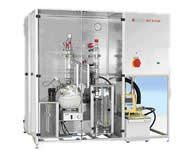The Differential Scanning Calorimetry (DSC)
The Differential Scanning Calorimetry (DSC) is the most popular measurement thechnique to detect endothermic and exothermic transitions like the determination of transformation temperatures and enthalpy of solids and liquids as a function of temperature. Therefore the sample and reference are maintained at nearly the same temperature throughout the experiment and the heatflux will be measured.
Because Linseis has many years of experience in constructing Differential Scanning Calorimeter, we have been able to meet highest demands for each request from research / development and quality controlwith with our DSC PT1000, DSC PT1000 HiRes, DSC PT1000 High Pressure and DSC PT1600 Series in a temperature range from -180°C to 1750°C and a pressure range from vacuum up to 300 bar.


Simultaneous TGA-DTA/DSC
Simultaneous TGA-DTA/DSC measures both heat flow (Differential Scanning Calorimetry) and weight changes (thermogravimetry) in a material as a function of temperature or time in a controlled atmosphere. Simultaneous measurement of these two material properties not only improves productivity but also simplifies interpretation of the results. The complimentary information obtained allows differentiation between endothermic and exothermic events which have no associated weight loss (e.g., melting and crystallization) and those which involve a weight loss (e.g., degradation).
The LINSEIS STA Platinum Series (Simultaneous Thermal Analysis) can be used to determine simultaneous changes of mass (TG) and caloric reactions (DSC) of a sample in the temperature range from –150°C up to 2400°C. The unique characteristics of this product are highest precision, highest resolution and long term drift stability. The STA Platinum Series was especially developed to meet the challenging demands of the high temperature as well as low temperature applications. To cover this broad range, several specifically designed furnace types are available. Furthermore MS (Mass Spectrometer) and FTIR Spectrometer couplings can be added to receive unique additional information. Due to its superior performance, user friendliness and modularity, the Linseis Simultaneous Thermal Analysis devices are an indispensable tool for every thermo analytical user.


Dilatometry (DIL)
Dilatometry (DIL) is a technique in which a dimension of a substance under negligible load is measured (e.g. expansion measurement or shrinkage measurement) as a function of temperature while the substance is subjected to a controlled temperature program in a specified atmosphere..
Linseis produces a wide range of Single-, Dual-, Differential-, Quattro-, Quenching-, Laser- and Optical Dilatometer in a temperature range from -180°C up to 2800°C and a resolution up to 0.3 nm. Thanks to our years of experience (est. 1953), Linseis offers Dilatometers with an unbeaten performance.

LFA - Laser Flash / XFA - Xenon Flash
The Laser Flash technique has proven to be the fastest and most reliable technique when it comes to thermal conductivity measurements and thermal diffusivity measurements. It enables a determination from -125°C up to 600°C (Xenon Flash) or -125°C up to incredible 2800°C (Laser Flash) in the range of 0.1 W/mK ... 2000 W/mK. Additionally for very thin samples (thin films from 80 nm up to 20 µm) we developed the Linseis TF-LFA (Thin Film LaserFlash Apparatus) using the Time Domain Thermoreflectance measuring technique that complementaries the Flash Series.

Thermogravimetry (TG)
Thermogravimetry (TG) is a technique in which the mass of the sample is monitored (balance) against time or temperature (thermal) while the temperature of the sample, in a specified atmosphere, is programmed. This technique serves the determination of material compositions. It is a common analysis method in the chemical and pharmaceutical industry. Thermogravimetric analysis (TGA) is performed on polymers, food, pharmaceuticals as well as many other materials.











